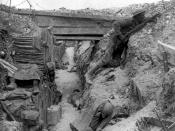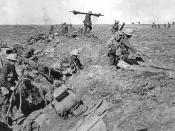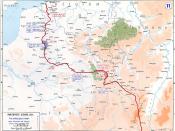The reasons for stalemate on the Western Front?
WW1 started as a war of quick lightning thrusts and high mobility, but degenerated into an astonishingly protracted war of static battle lines. The Western Front was the name given to the line of trenches stretching from the Belgium coast to Verdun. Following the Battle of Marne and Aisne of 1914, both sides dug in believing trenches to be temporary. The Front stretched for hundreds of miles, meshed with complex trench systems and barbed wire.
Why Stalemate
The military plans (Schlieffen, XVII...) had established a strict "war by timetable". However, aside from the quick mobilisation of nations, the plans failed. They were proved to be useless as modern warfare removed the momentum from conflict.
A poverty of strategic thought led to the stalemate. Both the British and French commanders were afflicted by the cult of the offensive. French generals Joffre and Nivelle were obsessed with the philosophy of esprit de corps - mass infantry charges (a reluctance to charge was linked to defeatism).
The British generals shared this outlook, as is superlatively demonstrated by Haig's "Big Push". The aim to engage the enemy and bleed them proved successful in the end, however it needed time over years to prove so.
The supremacy of defence due to technology helped prolong the war. WW1 was the first total war- a conflict between highly industrialized economies and militaries. Factories churned out ammunition; mass shells and people from both sides were conscripted. Barbed wire, machine guns, gas and rifles held out enemy advances. The absence of super weapons such as the tank and bomber were not yet developed and thus failed to counter these defensive tactics. The ability of the machine gun was equivalent to half a company of riflemen. Thus, sides were able...



Good
Good job. I liked how you explained it.
1 out of 1 people found this comment useful.